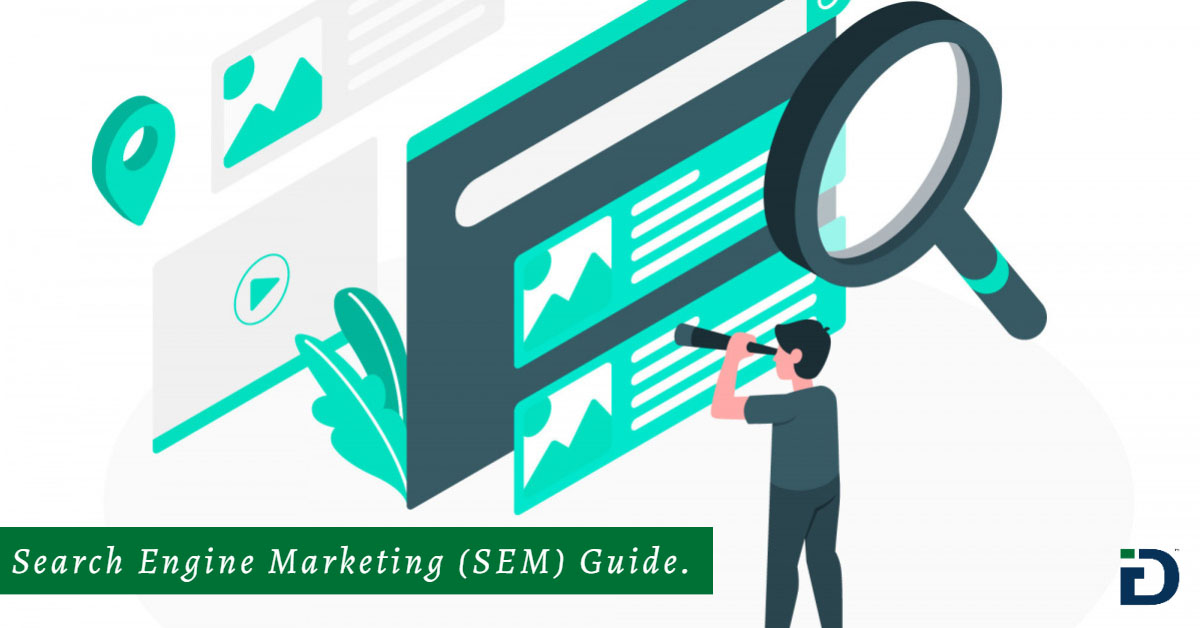

Contact
+91 8591174212Let's work together to bring your products and services to new digital heights!
Get in Touch

Apr 08, 2020

With the numerous upgradations in the field of digital marketing, a constant question that revolves around the mind of advertisers and marketers is what exactly is Search Engine Marketing.
Search engine marketing is about boosting visibility on the various search engines like Google, Yahoo, and Bing with paid tactics. For most businesses, ranking highly in search results isn’t luck, in fact, it is a result of massive efforts in one or both categories of search marketing. You must be wonder one or both? What are these? We mean SEO and SEM, both sound similar but are actually poles apart. Let’s understand both these search marketing terms by distinguishing them on the bases of some vital parameters.

Thought both SEM and SEO work differently for your organization their aims are similar.
a. They help a brand to come up on the search results page.
b. They are designed to drive traffic on your website.
c. Thay use the baton of keywords to uncover popular search terms.
d. Towards the end of both these search marketing tactics, tracking and testing will be required in order to optimize your search strategy for the future.
The next thing you need to know about Search Engine Marketing is, its different synonyms. Initially, Search Engine Optimization (SEO) and Paid Search Activities came under the Search Engine Marketing (SEM) umbrella. With digital marketing developments, SEM solely refers to paid search. SEM is also known as Paid search ads, Paid search advertising, PPC (pay-per-click), PPC (pay-per-call), CPC (cost-per-click) and CPM (cost-per-thousand impressions).

1. Define SEM Strategy:
Before you kick start your SEM campaign, you must define a strategy. What would that include? You start by defining your target audience and identify their needs and motivations. Only when your product or service can give a solution to their troubles or needs is when your product or service will work. Alongside this, you can also search for your competitors and check their market position. Lastly, your organization would need to identify important goals and benchmarks like search ranking, website traffic, sales, and other important ROI metrics.
2. Keyword Research:
The next step is not just to select the relevant keyword phrases, but also to chase for the keywords that your target audiences frequently search for. This procedure is similar while you perform On-page SEO. Optimize keywords with low competition and high usage. Your keyword search doesn’t end here, you should conduct brainstorm sessions with your target audience to know the popular terms that they utilize while searching for the kind of product and services that you offer. Constantly interacting with your loyal customer, sales and customer service representative is like a cherry on the cake to stay in touch with the frequently used phrases. You can also use various keyword research tools to generate your initial keyword list and then build on it.
3. Build PPC Campaigns:
Paid Search Engine Marketing is one of the most vital parts of today’s Search Marketing Strategy. You should aim to chase and bid on the most relevant keywords. To run a successful Pay-Per-Click (PPC) campaign, you need to pay heed upon the following checklist:
a. Budget per Month
b. Budget per Day
c. Scope of Geotargeting
d. List of Keywords
4. Optimize Website Landing Page:
Bagging quality inbound links is directly proportional to the popularity of your website in the eyes of search engines. This brings us to a critical role of the marketers to build links to their website from valued links of other sites that your targeted visitors frequently visit. It is equally important to design unique website content that is link-worthy. You should also try to get links from business partners, trade associations, vendors and customers. Distributing press releases and publishing blogs online is another tactic of Search Engine Marketing to fetch links.
5. Track, Measure And Report:
Tracking and Measuring the success of your SEM campaign is one of the most important Search Engine Marketing strategies. This not only helps to get a pulse of how successful the campaign us but also how we can alter or improvise elements for the future. In order to measure the success of your SEM campaign, you need to gauge CPC, Clicks, CPR, Impressions, Bounce rate, ROI, etc. We recommend you leverage Web Analytics tools for monitoring progress and to identify glitches for the same. You should always monitor your position in SERPs and then plan strategies for improving your search results.
Ref:
https://www.digitalvidya.com/blog/what-is-search-engine-marketing/
https://blog.alexa.com/sem-vs-seo/#difference
Let’s build a smarter, more connected future for your business. Get in touch with us today!

Office Address
6th Floor, Office Number 603, Ashok Premises, Old Nagardas Crossroad, Opposite Saraswati Towers, Andheri East, Mumbai, Maharashtra 400069
info@idigitize.co
Contact
@ 2024, iDigitize I All Rights Reserved I Designed, Developed & Managed By iDigitize Infotech LLP